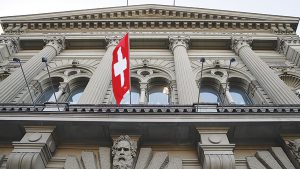Bloomberg
Switzerland’s government will not receive a payout from the Swiss National Bank (SNB) for 2022, as the central bank
projects the biggest loss in its 116-year history.
The SNB expects an annual loss of about 132 billion francs ($143 billion), more than five times the previous record, it said on Monday in preliminary results. The largest part of this, 131 billion francs, stems from collapsed valuations of its large pile of holdings in foreign
currencies, accrued as a result of decade-long purchases to weaken the franc.
The value of the SNB’s foreign-exchange reserves fell some 17% last year. As of December, it held 784 billion francs, down from 945 billion francs a year earlier.
Positions in Swiss francs saw a valuation loss of around 1 billion francs, while the SNB earned about 400 million francs on its gold holdings.
It is only the second time since the the central bank was established in 1906 that it has to skip its yearly payment to the federal government and Swiss cantons, forcing many of the 26 administrative districts to adjust their spending plans. For 2021, the institution had paid out 6 billion francs.
The conference of cantonal finance chiefs told SDA that while the loss is “regrettable,†interim earnings had suggested such an outcome. “It’s an established fact that SNB profits fluctuate widely and distributions cannot be taken for granted,†the body was cited as saying.
The 2022 loss in Switzerland is one of the most startling examples of how the global environment of rising interest rates has shifted the financial backdrop for central banks with
associated fiscal consequences.
In the neighbouring euro zone, national central bank governors face increasing pressure to explain why contributions to the domestic public finances from their activities are ceasing. In the UK, the Bank of England is no longer paying into the public purse and instead is receiving transfers from the Treasury to cover projected losses in its bond-buying program.
The SNB’s private shareholders will not receive a dividend for 2022 either. Unlike other central banks, the Swiss institution is a publicly traded joint-stock company, with about half the shares held by the public sector and rest by companies and private individuals.
Earnings from the SNB’s operations don’t influence monetary policy. Final results are due on March 6.
 The Gulf Time Newspaper One of the finest business newspapers in the UAE brought to you by our professional writers and editors.
The Gulf Time Newspaper One of the finest business newspapers in the UAE brought to you by our professional writers and editors.
